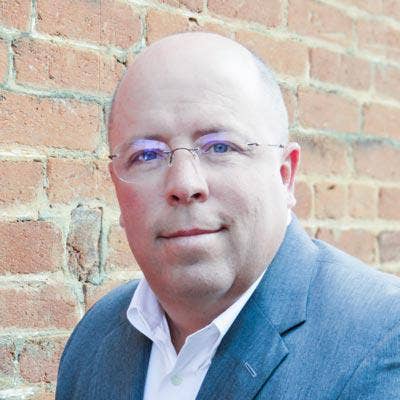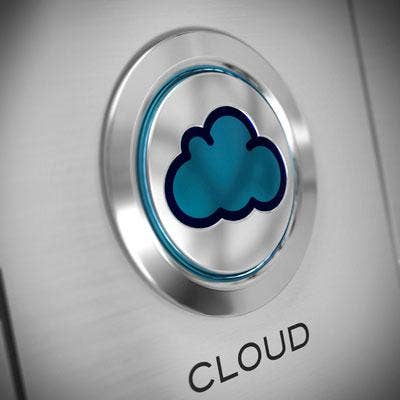Edge Solutions COO David Able On Driving Cloud Era Digital Transformation, Why AWS Is Growing Fast, And The Rise Of The Next-Generation Integrator

New Edge Solutions COO David Able On Driving Business Value
David Able, the new chief operating officer (COO) of Edge Solutions, the 10-year-old Tech Elite 250 CRN award-winning solution provider based in Alpharetta, Ga., says he is leading the charge to deliver "business value" rather than simply products.
"I want to enable the Edge family to focus on business value instead of product offerings," said Able in an exclusive interview with CRN. " We are going to build true value for our customers through that focus on understanding their business complications and then building service and product implementations that meet their business needs."
Able, who sold LogicsOne to national solution provider GreenPages five years ago, said solution providers must be in the digital automation business in order to be successful in the hybrid cloud era. "That is where we are going to focus," he said. "That includes software-defined networking and the automation associated with that. We are going to be involved with Ansible, Chef and Puppet. We are going to be involved with ServiceNow. We are going to be involved with a lot of different companies bringing together the hybrid model. The OEMs like Dell EMC, HPE and Hitachi are stitching together their own solutions. Everybody is doing their own play related to the changes in the industry including hyper-converged, [VMware] vSAN, Nutanix, SimpliVity. All those technologies bring value depending on the problem the customer has."

Why did you decide to join Edge Solutions as COO after founding several solution provider businesses?
I talked to a lot of people about where I wanted to go next when my non-compete was over and I chose Edge because it has a phenomenal culture and a great soul. The two owners, Julie and Michael Haley, and [Executive Vice President] Darin [DeHar] are phenomenal people. I pride myself on the fact that 'Good people bring good business.' That was the primary reason for joining Edge.

What are your top priorities as you take the helm?
I have three things I am planning on doing within my first six months. First, I am going to bring boutique quality services to the enterprise with the focused company structure like I had at LogicsOne. I want people to understand when we come in we are going to do an 'A' job.
Second, I want to enhance the offerings to include specialized technologies that deal with the cloud to reduce complexity for all customers. There is a tremendous amount of complexity that is making it hard for customers to decide what to do.
Third, I want to enable the Edge family to focus on business value instead of product offerings. We are going to build true value for our customers through that focus on understanding their business complications and then building service and product implementations that meet their business needs.

Talk about how your experience over the last 20 years as a solution provider founder and management consultant will be key as you take the COO role.
The network of incredible people I have met over the last 20 years gives me the ability to bring in other entrepreneurs that are part of the Southeast ecosystem to bring people to customers they would probably not be able to get to otherwise. That is one of the reasons why Edge saw my involvement as key to bringing them into the cloud era.

What kind of role will Edge playing helping customers grappling with the public cloud?
With the advent of public cloud, everybody is talking about cloud and transformation. I am going to focus on the actual tactical plans and implementations to truly help people as opposed to just talking strategy. Our goal is to be the people customers come to to implement and make things happen dealing with the people and process issues. In the past three years I have been involved some of the largest cloud transformations in the country. I bring a lot of hands-on knowledge from that.

What kind of tactical moves are you going to make to drive the Edge cloud transformation?
I am going to line up a network of people with the skill, talent and industry knowledge to make it happen. I am going to partner with the best-of-breed-focused companies in the Southeast and bring those teams together so we can build an offering list that no other company can.
Edge has the ability to bring other product technologies to bear based on their flexibility and the quality of people that exist here at Edge.
Edge is phenomenal in its ability to say what they are going to do and do what they say. I am really proud of joining this team.

Talk about what kind of technologies you need to bring to bear so customers can be successful with cloud transformation.
If anybody tells you they can ride one horse into the cloud they don't understand the market. When I built LogicsOne, VMware was a game-changing technology that customers needed to absorb to make that change. Today there is no one technology somebody can hold on to that is going to make cloud viable and easy and the ROI simple. That is not possible anymore. That is why a lot of VARs are having trouble. I believe the value of partners is to focus on the business problem and, based on the business problem, bring the right products to bear.
The below-the-line services and products I talk about is our traditional stuff. We are going to be really engaged with our existing partners and make sure they are providing all the value they have in their entire product streams. Then there are above-the-line services and products that help with some of the unique problems people are having now. Customers have to do things a little bit differently to save money and get to market quicker with automation.

What are the technologies you see as critical to bring customers into the hybrid cloud era?
To be able to support the hybrid cloud model that most companies are going to end up going to you have to be in the actual automation business in one way or another. That is where we are going to focus. That includes software-defined networking and the automation associated with that. We are going to be involved with Ansible, Chef and Puppet. We are going to be involved with ServiceNow. We are going to be involved with a lot of different companies bringing together the hybrid model. The OEMs like Dell EMC, HPE and Hitachi are stitching together their own solutions. Everybody is doing their own play related to the changes in the industry including hyper-converged, [VMware] vSAN, Nutanix, SimpliVity. All those technologies bring value depending on the problem the customer has. I am going to shift to business case analysis.
Like I did with LogicsOne, we are going to move to understanding the customer's business requirement and build out an ROI whether that ROI is faster time to market, solving operational issues or truly saving money.

What is the key to being successful with customers looking to accelerate digital transformation?
Today the answer a lot of the time is not saving money. That is why Amazon [Web Services] is growing. The key for CIOs is: are they getting to market faster and is that investment worth it? That is where we have to focus.
Most VARs actually try to lead with the fact that customers need to look at the cost because it costs you a lot less to go the traditional route. It is a business time-to-market problem [that customers are facing today]. It is about removing certain barriers within an organization that were organically grown.
People are moving to Amazon for very different needs, but they are also not moving everything into Amazon unless they are smaller. They are moving their most critical items that require that kind of agility and velocity. I know some very large enterprises that say they are all in on Amazon and yet only 20 percent of their stuff is going to Amazon. They are all in on their key apps that touch all their customers. Their traditional stuff is still back in the data center.
We are going to focus on what the business problem is. I am bringing together the right people to solve those problems. No one can do everything. The value I have is all of my contacts that have key businesses that provide very specific lift and shift, detailed agile development, large-scale cloud migration knowledge. We are bringing that to bear to customers.
Customers can come to us and say, 'I have a problem. What is the solution?' Not come and say, 'Do you sell X products?' I am really excited about that.

What is the difference between the LogicsOne VMware scenario versus today with the cloud transformation?
It is our responsibility to go into an account and actually figure out how we help them maximize their profitability. If we do that we become in a cliché term a partner. I want to become a friend. I want somebody customers can turn to and say, 'David, do you know anybody that does this in the marketplace?' That is the kind of relationship we want to have with customers.
We are going to shift the model like I did at LogicsOne where customers say, 'Here is our business issue. Do you know what can help with this?' That is what we are going to drive.

What is the biggest mistake most solution providers are making right now?
To me their focus is not on the customer, it is on their bottom line. Don't get me wrong, you have to watch the numbers. But you have to understand the market has changed. The traditional VAR model is under massive pressure. We have to move to what I consider a next-gen integrator. It is not just an integration of products. It is an integration of people and process and the connectivity to boutique players outside of the OEMs that can provide extreme value.

How often have you seen the market shift and what does that mean for solution providers?
Every eight to 10 years there is a massive shift in our industry. Those changes are getting radically different. They are increasing in pace. I think in the next five years we are going to have a massive shift again. IoT is going to have a huge impact on the VAR community. Today it is something on the periphery. We don't know how blockchain is going to impact us. There are so many things that VARs have to shift. We have to transform.
The technology is getting in some instances a lot simpler to deal with and in some instances it is getting way more complex to deal with. We have an issue of how do we bring young people into this industry with the knowledge to support the more complex stuff. It is a huge, heavy lift.

What is the danger as customers adopt digital transformation?
The industry doesn't realize that we are building automation on top of APIs [application programming interfaces] and APIs and APIs. If something goes wrong you really have got to have a severe knowledge base to figure out what is wrong so you don't have outages. Most organizations are trying to reduce their IT staff -- not hire more expensive people. We hope to actually help with that and give them kind of an insurance plan so they are not fearful about someone leaving. We want to give them the option to leverage someone like Edge to put a backup plan in place if key people leave.

You have built two solution provider businesses and sold them. Why are you doing it again?
This is my sweet spot. This is what I love to do. I like bringing good people together and I love being part of a great team. That is why I am doing this. It is that simple.
The important thing for me is to make the next 10 to 15 years of my life as fun as possible because I really enjoy helping people. If I can help people and make a buck here and there I am extremely happy. Julie and Michael and Darin share in that vision. That is the value. It is not about the end numbers. We don't have to answer to a board and investors. It's a great place to be when you are not answering to other people. You have the ability to do the right thing.